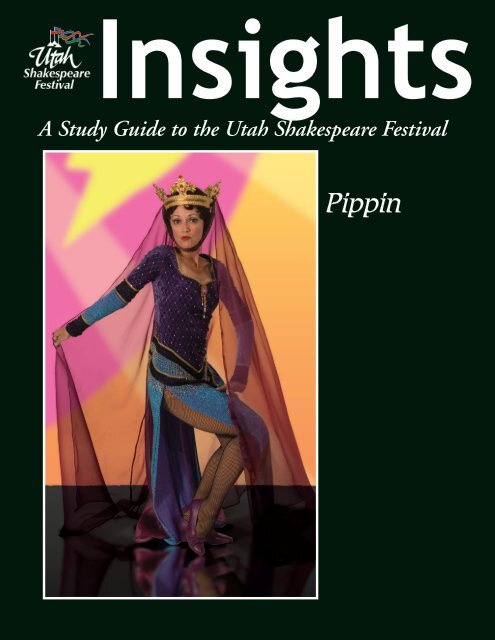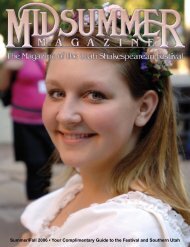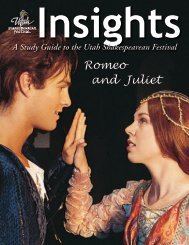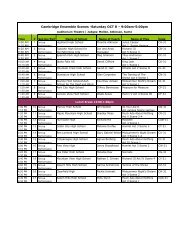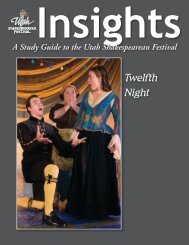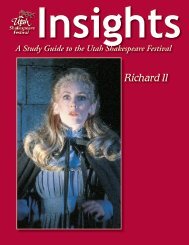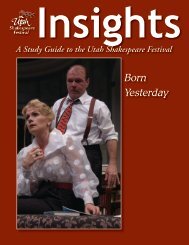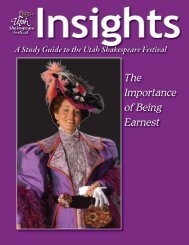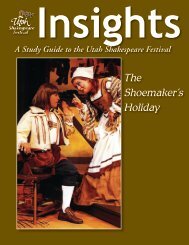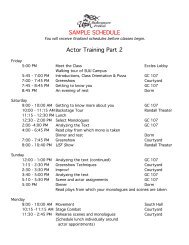Pippin - Utah Shakespearean Festival
Pippin - Utah Shakespearean Festival
Pippin - Utah Shakespearean Festival
Create successful ePaper yourself
Turn your PDF publications into a flip-book with our unique Google optimized e-Paper software.
Insights<br />
A Study Guide to the <strong>Utah</strong> Shakespeare <strong>Festival</strong><br />
<strong>Pippin</strong>
The articles in this study guide are not meant to mirror or interpret any productions at the <strong>Utah</strong> Shakespeare<br />
<strong>Festival</strong>. They are meant, instead, to be an educational jumping-off point to understanding and enjoying the<br />
plays (in any production at any theatre) a bit more thoroughly. Therefore the stories of the plays and the<br />
interpretative articles (and even characters, at times) may differ dramatically from what is ultimately produced<br />
on the <strong>Festival</strong>’s stages.<br />
Insights is published by the <strong>Utah</strong> Shakespeare <strong>Festival</strong>, 351 West Center Street; Cedar City, UT 84720. Bruce C.<br />
Lee, communications director and editor; Phil Hermansen, art director.<br />
Copyright © 2011, <strong>Utah</strong> Shakespeare <strong>Festival</strong>. Please feel free to download and print Insights, as long as you do<br />
not remove any identifying mark of the <strong>Utah</strong> Shakespeare <strong>Festival</strong>.<br />
For more information about <strong>Festival</strong> education programs:<br />
<strong>Utah</strong> Shakespeare <strong>Festival</strong><br />
351 West Center Street<br />
Cedar City, <strong>Utah</strong> 84720<br />
435-586-7880<br />
www.bard.org.<br />
Cover photo: Carol Kuykendall as Fastrada in <strong>Pippin</strong>, 2005.
<strong>Pippin</strong><br />
Contents<br />
Information on the Play<br />
Synopsis 4<br />
Characters 5<br />
About the Playwrights 6<br />
Scholarly Articles on the Play<br />
<strong>Pippin</strong>: Historically Speaking 8<br />
<strong>Utah</strong> Shakespeare <strong>Festival</strong><br />
351 West Center Street • Cedar City, <strong>Utah</strong> 84720 • 435-586-7880<br />
3
Synopsis: <strong>Pippin</strong><br />
<strong>Pippin</strong> is the son of fabled Emperor Charlemagne. As the play begins, we see an acting<br />
troupe, with the Leading Player inviting the audience to watch their magic as they help in telling<br />
his story. We are then introduced to <strong>Pippin</strong>, who tells us through song that he is searching<br />
for the real meaning and purpose of his life, his “Corner of the Sky.”<br />
<strong>Pippin</strong> tells his father that he wants to be a soldier and go to war with him. Eventually, he<br />
learns that being a war hero is not the answer to his quest. So, he goes to his grandmother and<br />
seeks wisdom from her. She tells him to enjoy his youth and live life to the fullest. The first act<br />
ends with <strong>Pippin</strong> deciding to lead a revolution against his father.<br />
As Act Two begins, we meet <strong>Pippin</strong>’s devious but charming stepmother, Fastrada. Learning<br />
of <strong>Pippin</strong>’s plot against his father, she sees a way to eliminate both king and prince, leaving the<br />
way clear for her son, Lewis. She informs <strong>Pippin</strong> that the king will be alone and unguarded at<br />
his yearly prayers at Arles. <strong>Pippin</strong> goes there, confronts his father about his many civil crimes,<br />
and stabs him.<br />
<strong>Pippin</strong> becomes king and decides that the answer to all problems is to eliminate taxes, give<br />
land to his peasants, give money to the poor, and abolish the army. Soon, <strong>Pippin</strong> is forced to<br />
revoke all his promises, and goes back to the body of his dead father. It seems reasonable to ask<br />
his father if he might have his knife back, and Charlemagne obliges. The king then takes back<br />
the crown, and <strong>Pippin</strong> is once again alone.<br />
<strong>Pippin</strong> has abandoned all hope as he lies in the middle of the road. Catherine, a widow with<br />
a small son and a large estate, finds him there, cleans him up, and tries to interest him in something.<br />
Feeling that no one can resist a small boy, she sends her son Theo to talk with <strong>Pippin</strong>, all<br />
to no avail. Finally, she convinces him to help her in running her estate, and, for while, he gets<br />
into the spirit of everyday life.<br />
Eventually, <strong>Pippin</strong> feels that the menial chores of running a household are beneath his dignity<br />
and he tells Catherine he is leaving. To complicate matters, Theo’s duck, Otto, gets sick and<br />
the young boy brings him to <strong>Pippin</strong> for help. <strong>Pippin</strong>, for the first time, finds himself trying to<br />
lighten the burden of someone else, as he does his best to cheer up the disconsolate boy.<br />
As time goes on, <strong>Pippin</strong> finds himself falling in love with Catherine, as she is with him.<br />
<strong>Pippin</strong> realizes that they are becoming a regular family, and the thought terrifies him. Again, he<br />
must leave, feeling that there is more to life to be found.<br />
What is left but the finale! A trick fire-box is rolled onto the stage with a banner that reads<br />
“<strong>Pippin</strong>’s Grand Finale.” A player sets fire to a dummy inside the box, and the troupe applauds.<br />
<strong>Pippin</strong> is not impressed, and the Leading Player assures him that when he, <strong>Pippin</strong>, does it,<br />
it will be for real. He has always wanted to do something extraordinary. What could be more<br />
extraordinary than this <strong>Pippin</strong> walks into the box, but stops just before the flames approach.<br />
Catherine and Theo appear, and <strong>Pippin</strong> goes to them.<br />
The Leading Player apologizes to the audience for the failure of the promised “Grand<br />
Finale” and all the players leave the stage. <strong>Pippin</strong>, Catherine, and Theo are totally alone on the<br />
stage.<br />
Catherine asks <strong>Pippin</strong> if he feels like a coward. No, he responds. He feels “trapped, but<br />
happy.” Thus ends this musical comedy, with <strong>Pippin</strong> finding common happiness in the world<br />
around him.<br />
4<br />
<strong>Utah</strong> Shakespeare <strong>Festival</strong><br />
351 West Center Street • Cedar City, <strong>Utah</strong> 84720 • 435-586-7880
Characters: <strong>Pippin</strong><br />
Leading Player: The leader of a group of actors who serve as a sort of musical prologue to the<br />
play, the Leading Player is a roguish magician who appears throughout the play, introducing<br />
the characters, filling in much of the background and offering commentary on the goings-on.<br />
It is he who orchestrates the much-anticipated play’s “climax.”<br />
<strong>Pippin</strong>: The young son of fabled Emperor Charlemagne and heir to the throne, <strong>Pippin</strong> is a<br />
bright, educated young man whose restless quest for “something completely fulfilling” in life<br />
leads him to seek that fulfillment in soldiering, physical pleasure, murder (well, sort of), taking<br />
over his father’s empire (temporarily), poverty, and finally, love. What’s left for him but<br />
the play’s colossal climax<br />
Charles: The emperor Charlemagne, Charles is a less-than-attentive father who basically loves<br />
<strong>Pippin</strong>. His education was gained on the field of battle, rather than from books, and his basic<br />
preoccupation is with war, carnage, conquest and ruling his empire, as is probably befitting<br />
the most powerful man in the world. He indulges his wife Fastrada’s extravagance, but isn’t<br />
too fond of their son, Lewis.<br />
Lewis: <strong>Pippin</strong>’s not-too-bright half-brother, and, after <strong>Pippin</strong>, heir to the throne, Lewis is doted<br />
upon by his mother, Fastrada, as she attempts to promote his chances of becoming principal<br />
heir. Not at all like <strong>Pippin</strong>, Lewis loves weight lifting, wrestling, showing off, and, most of all,<br />
Lewis.<br />
Fastrada: Charlemagne’s wife and Lewis’s mother, Fastrada is devious, crafty, cunning, untrustworthy,<br />
but a warm and wonderful mother to Lewis. She is dedicated to gaining the throne<br />
for her darling son, Lewis, in just about any way she can.<br />
The Head: The dismembered head of a common man, a Visigoth who died on the field of battle<br />
against the armies of Charlemagne, the Head relates the realities of warfare to <strong>Pippin</strong>. The<br />
Head finds no glory in having died for his king, no glory in any of the battles he has previously<br />
fought in, no glory at all.<br />
Berthe: <strong>Pippin</strong>’s grandmother and Charlemagne’s mother, Berthe is still attractive and lives in the<br />
country where she enjoys the simple pleasures of the senses. Having found no fulfillment in<br />
warfare and battle, <strong>Pippin</strong> comes to her for advice. Enjoy your youth, and all the pleasures the<br />
senses can afford, she tells him.<br />
Beggar: A poor subject of Charlemagne’s empire, which <strong>Pippin</strong> has taken over, the Beggar convinces<br />
<strong>Pippin</strong> of the unfairness of Charlemagne’s taxes.<br />
Peasant: A poor subject of Charlemagne’s empire, the Peasant convinces <strong>Pippin</strong> that those who<br />
work the land should own it.<br />
Field Marshall: A military leader in Charlemagne’s empire, the Field Marshall informs newlycrowned<br />
<strong>Pippin</strong> of impending disaster as the Huns have attacked and there is no army to<br />
ward them off.<br />
Noble: A nobleman of the empire, he points out to <strong>Pippin</strong> that without taxes and land ownership,<br />
he has no power over the peasants to raise an army.<br />
Catherine: A widow with a young son and a large estate, Catherine finds <strong>Pippin</strong> in a distraught<br />
state after his debacle at trying to rule his father’s empire and takes him in. She is young,<br />
attractive, practical, understanding, down-to-earth and in love with <strong>Pippin</strong>.<br />
Theo: A small loveable boy, Theo is Catherine’s son and becomes <strong>Pippin</strong>’s friend.<br />
<strong>Utah</strong> Shakespeare <strong>Festival</strong><br />
351 West Center Street • Cedar City, <strong>Utah</strong> 84720 • 435-586-7880<br />
5
6<br />
<strong>Pippin</strong>: The Playwrights<br />
By Josh Stavros<br />
From Insights, 2005<br />
Shakespeare penned the words “Two households, both alike in dignity,” to describe the<br />
star-crossed families of Montague and Capulet, but this phrase could be applied to the collaborators<br />
behind <strong>Pippin</strong>, the hit musical penned by Stephen Schwartz and Roger Hirson.<br />
Stephen Schwartz, who wrote the music and lyrics for <strong>Pippin</strong>, was born in New York City<br />
on March 6, 1948. He studied piano and composition at the Juilliard School of Music while<br />
in high school and graduated from Carnegie Mellon University with a B.F.A. in drama. He<br />
worked for a time as a producer for RCA Records, but soon found his way to Broadway.<br />
His first major credit was the title song for the play Butterflies are Free; the song was also<br />
used in the 1972 film version. In 1971, he wrote the music and new lyrics for Godspell, for<br />
which he won several awards including two Grammys. With the success of Godspell, Schwartz<br />
found himself hyper-propelled to Broadway fame at the ripe age of 23. He instantly became<br />
the media darling of Broadway, and seemed to be destined for greatness. While Godspell was<br />
Schwartz’s first musical produced on Broadway, it wasn’t the first he had written. Along with<br />
several other shows, he actually began <strong>Pippin</strong> in college, under the title <strong>Pippin</strong> <strong>Pippin</strong>. He<br />
described it as a musical version of The Lion in Winter, with “court intrigue and everyone<br />
singing really . . . sarcastic songs” (“Stephen Schwartz, It’s an Art: Reflections on a Life in<br />
Song,” interview by Jem Aswad, http://www.ascap.com/filmtv/Schwartz.html, January 2005).<br />
The show evolved over the next six or seven years into a semi-disguised autobiographical story,<br />
and after meeting Roger Hirson in 1969, the pair reworked the show, keeping some of the<br />
plot and story, but changing all of the songs and music. Hirson commented that the show<br />
was written without any advice or support from a producer or director, but <strong>Pippin</strong>, as it was<br />
now called, was eventually picked up by producer Stuart Ostrow (who also produced such hits<br />
as 1776 and M. Butterfly) and Broadway legend Bob Fosse signed on as director. The show<br />
opened in Washington in 1972, and went to Broadway six weeks later.<br />
Schwartz’s golden age, however, was already beginning to wane. He experienced major<br />
creative differences with director Bob Fosse. Schwartz described himself at the time as being<br />
on a bit of an ego trip, and that combined with Fosse’s reputation in New York and lackluster<br />
reviews of Schwartz’s The Magic Show two years later and The Baker’s Wife, which closed<br />
even before it reached Broadway due to a disastrous out-of-town tryout tour in 1976, seemed<br />
to spell the end of Schwartz’s Broadway career. In his words: “My career in the theatre basically<br />
lasted seven years. I stopped in 1978 [after doing Working] and briefly came back to do<br />
Rags [1986], and that wasn’t a very good experience, and I never worked in the theatre in New<br />
York again” (Aswad).<br />
That, however, proved to be untrue. He stayed away from working and writing until<br />
1981, when he was approached to adapt Working for television. His next major production<br />
was the music and lyrics for a Biblically based show called Children of Eden. The show, which<br />
never made it to Broadway, has enjoyed major success regionally.<br />
Next, after the death of lyricist Howard Ashman, Walt Disney Studios was looking for<br />
someone to team up with composer Alan Menken (the dynamic duo responsible for Little<br />
Shop of Horrors, The Little Mermaid, Beauty and the Beast, and Aladdin). Schwartz teamed<br />
up with Menken and wrote lyrics for the Disney films Pocahontas (for which he won two<br />
Academy Awards) and Hunchback of Notre Dame. He then wrote songs for DreamWorks’s<br />
smash hit Prince of Egypt, garnering another Academy Award for the song “If You Believe.”<br />
<strong>Utah</strong> Shakespeare <strong>Festival</strong><br />
351 West Center Street • Cedar City, <strong>Utah</strong> 84720 • 435-586-7880
Schwartz’s bittersweet return to Broadway finally came in 2003, with the opening of the Tony<br />
Award-winning Wicked, the “real” story behind The Wizard of Oz. While various aspects of the<br />
show were recognized, Schwartz himself failed to win the Tony for composition. He recently<br />
released a solo album, and currently is working with ASCAP organizing and teaching music and<br />
theatre workshops.<br />
Roger O. Hirson collaborated only once with Schwartz—by writing the book for <strong>Pippin</strong>. The<br />
play, however, has cemented both in the annals of musical theatre history. Hirson already had an<br />
established career as a television writer. He wrote for such programs as The Kraft Television Theater,<br />
Goodyear Television Playhouse, Philco Television Playhouse, and Studio One. He had written the<br />
book for one musical, Walking Happy, in 1966.<br />
One thing both men have in common is a great sense of humor. Stephen Schwartz’s official bio<br />
notes that some of his most coveted awards include his “handful of tennis trophies.” Hirson mentioned<br />
that while he and Schwartz remained friends, they have never worked on anything since.<br />
<strong>Pippin</strong> also proved to be his last musical. He went on to write several screenplays, including Bridge<br />
at Remagen (1969), Demon Seed (1977), and the teleplay for The Christmas Carol, starring George<br />
C. Scott (1984). He is currently retired and living in New York City. Hirson also mentioned in a<br />
recent letter that a part of his and Schwartz’s friendship includes the occasional bridge game, adding<br />
that they played “just last week, and although [Hirson and partner] played better, Schwartz and his<br />
wife won” (Letter to Josh Stavros, January 2005).<br />
<strong>Utah</strong> Shakespeare <strong>Festival</strong><br />
351 West Center Street • Cedar City, <strong>Utah</strong> 84720 • 435-586-7880<br />
7
<strong>Pippin</strong>: Historically Speaking<br />
By Lawrence Henley<br />
From Insights, 2005<br />
<strong>Pippin</strong> is a festively staged musical exploration of life’s endless search for human fulfillment.<br />
The show, conceived and created by some of the most innovative creators of musical theatre in any<br />
era, was destined for success. Opening on Broadway on October 23, 1972 at the Imperial Theatre,<br />
it ran for a cool 1,944 performances, closing on June 12, 1977. Producer Stuart Ostrow also gave<br />
life to 1776, The Apple Tree, and M Butterfly. <strong>Pippin</strong>’s original New York set and lighting designers<br />
were both of Hall of Fame caliber: Tony Walton and Jules Fisher. Standing above all else, the contributions<br />
of two of the brightest stars in American musical theatre guaranteed the show’s staying<br />
power.<br />
<strong>Pippin</strong> was altered considerably from its original state of pure pastel fantasy into something<br />
much darker by legendary director and choreographer Bob Fosse. The show became what was, in<br />
its time, one of the most innovatively staged performances Broadway had yet seen. In fact, from<br />
the mid-fifties until the eighties just about anything this genius laid his hands on turned to gold.<br />
A legendary figure in New York, Fosse was the king of razzle-dazzle; the prime mover behind masterpieces<br />
like Sweet Charity, Damn Yankees, Chicago, Bells Are Ringing, the self-titled Fosse, and his<br />
classic 1981 film, the autobiographical All That Jazz, which featured Roy Scheider as a vice-riddled,<br />
hedonistic, and obsessive showbiz workaholic.<br />
Together with book writer Roger Hirson, composer and lyricist Schwartz created a charming,<br />
intimate musical, borrowing (loosely) from the story of <strong>Pippin</strong>, son of the Emperor of the Holy<br />
Roman Empire.<br />
Charlemagne’s stature during the latter-eighth century was exceeded only by the Pope’s (if even<br />
that!). Initially, <strong>Pippin</strong> was designed to be a medieval-style pageant presented by a troupe of wandering<br />
players; the leader of which was to be an elderly man. When Fosse was hired to direct, a<br />
much younger man-a dancer-from the film version of Sweet Charity was contacted for the audition.<br />
He was given the part, and following the audition the “lead actor” concept metamorphosed into<br />
the “Leading Player.” Thereafter, Ben Vereen would become a household name.<br />
Today’s audiences may be inclined to view <strong>Pippin</strong> as a period piece. In the day of its creation,<br />
the music and lyrics typified the “tres hip” genre known as the rock musical. Certainly, <strong>Pippin</strong><br />
bears much musical resemblance to other hits of the era: Hair, Godspell, Joseph and the Amazing<br />
Technicolor Dreamcoat, and Jesus Christ Superstar. In fact, the soundtrack was so completely in<br />
tune with the times that the famed Motown label did the pressing, loaning a trio of the show’s hits<br />
to its own artists: The Jackson Five/Michael Jackson (“Corner of the Sky,” “Morning Glow”) and<br />
The Supremes (“Guess I’ll Miss the Man”).<br />
While <strong>Pippin</strong>’s characters were based primarily on the legends of historical figures from medieval<br />
Western Europe, they became caricatures, not likenesses, of their namesakes. The youthful lead<br />
(first played by John Rubinstein) only vaguely resembled a prince of the Frankish Empire (actually<br />
named Pepin). The rudimentary explanation of the character’s origins is that in life he was the<br />
son of King Charlemagne, generally acknowledged to be the greatest of all medieval kings. <strong>Pippin</strong>’s<br />
grandmother, Bertrada (“Berthe Greatfoot”), is also portrayed in the show. We know that the ruler<br />
divided his Empire in 806 A.D. among three sons: Pepin (Carloman), Charles, and Louis. Both<br />
Pepin (king of Italy) and younger brother Charles (king of Neustria) died prematurely (respectively<br />
in 810 and 811 A.D.). Only Louis “the Pious” remained alive to sit on the throne, and, as a ruler,<br />
Louis was so absorbed in sanctimony that he was only semi-competent to govern in such a ruthless<br />
era. <strong>Pippin</strong> instead portrays “Lewis” as a narcissist.<br />
8<br />
<strong>Utah</strong> Shakespeare <strong>Festival</strong><br />
351 West Center Street • Cedar City, <strong>Utah</strong> 84720 • 435-586-7880
In reality, of course, things were more complicated: Charlemagne actually had two sons<br />
named Pepin! <strong>Pippin</strong>’s lead character seems to draw traits from both of their profiles, merging<br />
them into a single prince.<br />
The first son, known as “Pepin the Hunchback,” was sired in Charlemagne’s earliest union<br />
with Himiltrude, thirteen-year-old daughter of the Lombard king. The marriage was arranged<br />
by Bertrada, contrary to the young ruler’s wishes. Charlemagne acquiesced, but after usurping<br />
his father-in-law’s kingdom the marriage was annulled, rendering his first son illegitimate.<br />
Contrary to the play, while attractive, his good looks were marred by a spinal deformity (hence<br />
the nickname). Despite the divorce, Pepin probably had faint ideas of succeeding his royal<br />
father, but was never a contender to inherit the throne. Nonetheless, the bastard became a popular<br />
figure in the Carolignian court.<br />
In <strong>Pippin</strong>, the prince is convinced by others to murder his father, an act founded in historical<br />
fact. Permitted to remain at court, the hunchback became a target for those who tried<br />
to hold sway with him in order to curry favor with, or, conversely, overthrow the king. In 792<br />
A.D., several out-of-favor courtiers capitalized on Pepin’s envy of his stepbrothers, persuading<br />
him to play a featured role in a botched coup d’etat. Useful in carrying out the murders of the<br />
king, his wife, and their three legitimate sons, Pepin was to be crowned as a “puppet” king. The<br />
scheme could have worked, but a priest caught wind and the plot was exposed. Charlemagne<br />
arrested, tried, and executed all other conspirators. Unsurprisingly, the hunchback’s sentence<br />
was commuted in short order, and he was sent to a monastery to live as a monk, dying there<br />
after two decades in seclusion.<br />
The second Pepin was originally dubbed “Carloman,” a name borrowed from<br />
Charlemagne’s deceased brother and uncle. The rechristening was likely a protective move to<br />
see that the hunchback was removed entirely from the line of succession, initiated by his stepmother<br />
Hildegarde (<strong>Pippin</strong>’s Fastrada), third wife to Charlemagne and daughter of the Prussian<br />
ruler. Pepin was eldest of the king’s legitimate sons, destined to become ruler of Italy and eventually<br />
heir to the Holy Roman Empire. The education of his children in the liberal arts was<br />
most important to Charlemagne. In the Frankish tradition it was also dictated that male heirs<br />
would learn horsemanship, as well as practice the skills of war and the art of the hunt. In life,<br />
Pepin sired a son, Bernard, and five daughters.<br />
To the point: we see any number of these elements introduced into <strong>Pippin</strong>. The young<br />
prince returns from the University in Padua. His wicked stepmother Fastrada does her best<br />
to see her stepson disinherited in favor of her own son, “Lewis.” <strong>Pippin</strong> learns that “War is a<br />
Science.” Prompted by the Leading Player’s accusations of malfeasance and oppression of the<br />
people, <strong>Pippin</strong> vanquishes his father and becomes king.<br />
At the end of the play, we see him with a family of his own. What the play adds to the true<br />
story of <strong>Pippin</strong> is the theme of fulfillment: most things he encounters in the life of play fulfill<br />
him only temporarily. He carries on the search for happiness throughout three-fourths of the<br />
show, concluding it once he learns that life’s true joy is only experienced through a deeper sense<br />
of love.<br />
Integrating biographical facets and emotional themes with a musical theatre style that runs<br />
from commedia to vaudeville and burlesque, <strong>Pippin</strong> symbolizes the search for satisfaction of<br />
a youth born into a life of privilege. While he may be heir to his father’s throne, he seeks his<br />
own place in life: a “Corner of the Sky” that’s his alone. This central theme of the play was<br />
very much in tune with the post-hippie period in which the show was first produced: wealth,<br />
knowledge, and power can’t buy love, peace, family, or the sense of individualism-all buzzwords<br />
from that era. The play demonstrates that these are the only things in life that ultimately can<br />
fill <strong>Pippin</strong>’s inner void.<br />
<strong>Utah</strong> Shakespeare <strong>Festival</strong><br />
351 West Center Street • Cedar City, <strong>Utah</strong> 84720 • 435-586-7880<br />
9
<strong>Pippin</strong> is led through a series of experiences throughout the journey of the play reminiscent of<br />
the late-medieval morality drama Everyman. Sent on a visit with manifestations representing all<br />
of mortal life’s weaknesses, Everyman learns through his humbling adventure that Pride, Strength,<br />
Knowledge, Fellowship, the Four Wits, and other manifest human qualities are at best fleeting, and<br />
they will not take him where he ultimately wants to be (in heaven). Mortals can only be turned<br />
asunder when they misplace their faith and trust in these things. In turn, <strong>Pippin</strong> is tempted by and<br />
dabbles in greed, lust, gluttony, control, and many of life’s other excesses and temptations; all of<br />
this leads him to the realization that, ultimately, investing heavily in any of them will not bring him<br />
happiness.<br />
The play also has a commonality with Marlowe’s tour of the supernatural, Doctor Faustus.<br />
Faustus finds that becoming all-powerful through the practice of black magic will ultimately contribute<br />
to his undoing. Given that his privileges, fair-haired looks, and carte blanche status in the<br />
world could be likened to that of a rock star or an elite politician, <strong>Pippin</strong> has the power to experience<br />
all of the temporary “highs” that life offers: triumph in battle and politics; scores of beautiful<br />
women who can’t keep their hands off of him, and the like. Yet in none of this extreme fortune and<br />
success can he find anything but the most tentative fulfillment. Until he can learn that the key to<br />
happiness is the process of throwing off all avarice and lust, there will be no satisfaction in <strong>Pippin</strong>’s<br />
life.<br />
In the end, <strong>Pippin</strong> grows up. As the curtain falls, he understands that the rewards which can be<br />
claimed by those who shun darkness might well be life’s best.<br />
10<br />
<strong>Utah</strong> Shakespeare <strong>Festival</strong><br />
351 West Center Street • Cedar City, <strong>Utah</strong> 84720 • 435-586-7880
<strong>Utah</strong> Shakespeare <strong>Festival</strong><br />
351 West Center Street • Cedar City, <strong>Utah</strong> 84720 • 435-586-7880<br />
11


